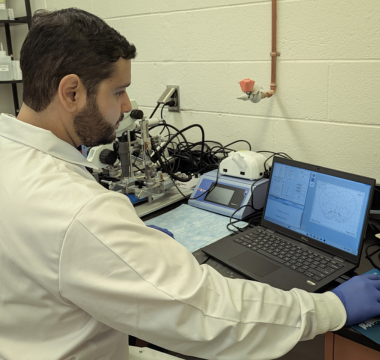My PD Story

Kauê M. Costa, PhD
2025 Impact Award
Investigating How Neurons Rebalance Their Roles in Early Parkinson’s
In Parkinson’s disease (PD), cognitive symptoms often appear years before movement symptoms begin. However, these cognitive symptoms — difficulties performing tasks involving decision-making and learning — are linked to many different diseases and therefore difficult to use as an indicator for PD without additional clinical evidence.
Kauê M. Costa, PhD, recipient of a Parkinson’s Foundation Impact Award, is diving into the complex neuroscience of PD to better understand what causes cognitive PD symptoms to occur before movement symptoms. This research could help lead to improved treatments for PD cognitive symptoms and support earlier PD diagnoses.
“This research has the potential to shed light on intrinsic mechanisms of adaptation to cell loss that could be leveraged for developing new treatments for the disease, and to identify early biomarkers of Parkinsonian degeneration, which could be used for early diagnosis and intervention.” – Dr. Costa
As PD progresses, dopamine-producing neurons in the substantia nigra region of the brain lose function and break down. The most fragile of these neurons, and usually the first ones to degenerate, are located in the lateral substantia nigra (lSN) and are important for sending movement signals to another brain region called the dorsolateral striatum (DSL).
Dr. Costa hypothesizes that as these lSN neurons break down in early PD, the neighboring neurons in the medial substantia nigra (mSN) attempt to “pick up the slack”, taking over the lost movement signaling responsibilities. However, doing so means sacrificing efficiency in their other role, which involves cognitive signaling. This could explain why cognitive symptoms appear first, as the brain reorganizes neurons to preserve movement signaling at the expense of cognitive signaling.

From his lab at the University of Alabama at Birmingham, Dr. Costa will test his hypothesis by measuring the abilities of rats to perform learning-based and movement tasks before and after they are induced with simulated PD. Using state-of-the-art brain monitoring technology, Dr. Costa will also record dopamine released by both lSN and mSN neurons over time, observing how they change and adapt as the simulated disease progresses and if they follow his prediction of reorganized signaling roles.
By understanding what is happening in the brain in early PD to cause cognitive symptoms before movement ones, doctors could improve the ability to diagnose the disease earlier, treat cognitive symptoms more efficiently, and potentially delay additional symptoms.
“This Impact Award will allow me to apply my expertise to solving an important question in Parkinson's disease pathology, which I have been thinking about since I was a graduate student,” said Dr. Costa. “I am grateful to the Parkinson's Foundation for the opportunity to pursue my interests in the intersection of basic and translational neuroscience.”
Meet more Parkinson’s researchers! Explore our My PD Stories featuring PD researchers.
Related Materials
More Stories
from the Parkinson's community


